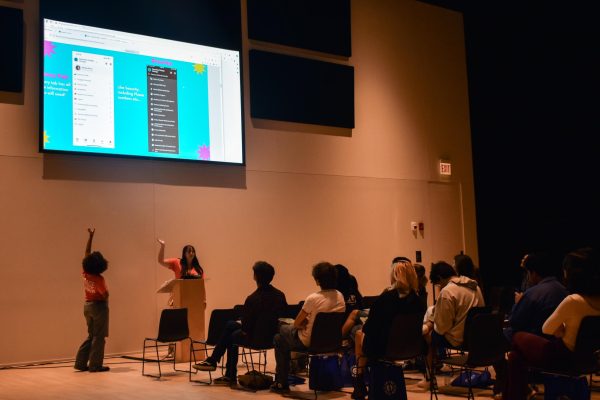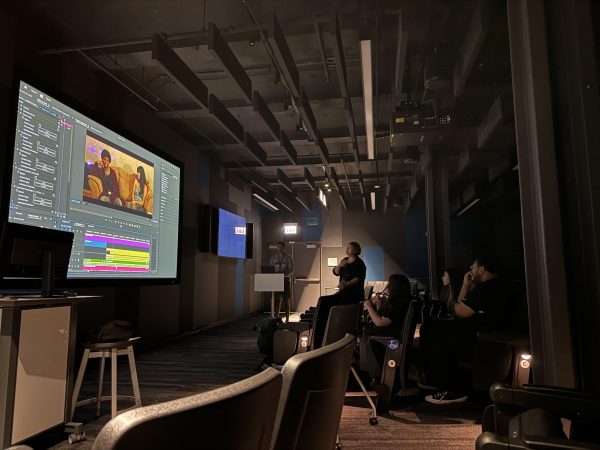Across a Generation: A Series
October 5, 1998
PART 1: WHY CHELSEA CLINTON’S CLASS CAME BACK
Leon Tripplett
Focus Editor
Kip Gerenda spends most of his nights these days in Columbia’s dorms talking with a possible business partner about opening up their own fashion line. “You have to consider others’ needs when you’re designing,” he says passionately.
A few yards south, Johnnie Brudder is preparing for his new nightly ritual — building his body weight and trying to stay fit for when he joins the Marine Reserves. He chose to join the military because he didn’t want to burden his parents with tuition bills. “I’m not going to have a fifth year in college,” he says emphatically. “I have to finish up in four years because my brother will be in college and I know my parents won’t be able to afford it.”
In front of the Wabash building you can find Lawrence Shaw networking with other students with a watchful eye for prospective clients. “I’m about business, and I don’t won’t to be around people who are not about business.”
It’s hard to catch up with Duane Freeman, who juggles a full load of classes, helps to manage the comedic organ of Chicago, Second City, and has enrolled in classes at Improv Olympic. “I just want to make people laugh,” he says reflectively. “There’s enough sadness in the world already.”
They all have something in common besides their zeal to make theatrical forays into their respective industries — they’re all sophomores, 19-somethings who will graduate in the first year of the new millennium and make the transition into adulthood in the early part of the 21st century.
Last year the polling firm Louis Harris and Associates collaborated with Northwestern Mutual Life to conduct a survey of the nation’s freshmen. The report, “Generation 2001,” attempted to gauge the pulse of 2001 freshmen at 2001 private and public 4-year colleges and universities.
The report concluded, in short, that the “stereotypical image of a generation 2001 student is often that of a self-interested, lazy youth with few goals beyond their plans for that evening.”
“Those are the stereotypes they have about us because they don’t know us, they don’t really understand us and how we feel about certain issues,” says Shaw, a Columbia sophomore studying music management.
The goal of the ambitious project was to measure how generation 2001 view themselves and other generations, their career and lifestyle goals and aspirations, and lastly, their outlook on politics and society.
The Chronicle began asking some of the same questions posed to the class of 2001 last year, how they’ve changed in one year, and what their role will be in the next millennium.
“Last year was great … I had a lot of fun,” says Freeman of his first year at Columbia. “I felt a sense of community and school pride that I hadn’t felt in a long time. People actually cared about what you were involved in, and they were eager to help you.”
Freeman represents the sentiment echoed by many in his class who made the decision to come back to higher education. It’s welcome news to college and university recruitment departments that have been toying with new ways to keep freshmen in college.
Programs have been developed at just about every public and private higher education institution to stem the growing drop out rate that has ballooned over the past two years to a record 27 percent, according to the American College Testing Board.
Freshmen Seminar at Columbia is geared to do just that — to act as a life preserver for recent high school graduates entering college for the first time.
An overwhelming majority of sophomores that the Chronicle interviewed said there was no question that they would come back a second year. In fact, many never left. Freeman and others stayed put in Chicago to continue working or interning at record companies, media organizations, or just taking summer courses to ensure graduation in 2001.
“Why go home … there’s nothing to do there. I thought it would be a waste of timeso I stayed here in Chicago,” says Freeman.
Brudder returned home for the summer, but his heart was set on getting back to Columbia to do what he says he’s been wanting to do for a long time. Much to his parents’ dismay, he decided to get financing for two more years of Columbia by joining the military. He wants to be a film director, and nothing, he says, will stop that.
“My parents are always waiting for the next Vietnam to occur. Their outlook on the military is ‘You don’t know, they may get into a war and you’ll be there for the next 13 years or so.’”
Save for the spectre of war, Brudder is actually doing his parents a big favor. By enlisting in the Marines Reserve unit, he’ll be saving his parents $10,000 on student loans that the military will pick up the tab for.
Shaw, like Brudder, knows that breaking into research bears this out. Says Deanna Tillisch, director of the study, “Top line results of the study show a certain ‘sense and sensibility’ about this group — a well balanced mixture of mind and heart. On the one hand, the sensibilities of Generation 2001 students appear to be alive with idealism and optimism, and a vision of a better world. On the other hand, they also appear to be well-grounded. This generation is not so blindly idealistic or optimistic as to deny the realities in life, or that there are challenges and issues to face.”
“I was sort of intimidated by the people who were so far ahead and those who were upperclassman,” says Shaw about his first year at Columbia. “But I knew I had to do everything I could to crush the competition in my major.”
Meanwhile, on where the country is headed, last year’s freshmen were sharply divided, and in the wake of the current feeding frenzy in Washington D.C. this hasn’t changed. However, contrary to popular belief, Generation 2001 are not apathetic, voiceless citizens. They plan to change the political state on their own terms, pretty much the same way their predecessors, the Baby Boomers, did.
The report found that 92 percent plan on voting in upcoming elections. Sophomores at Columbia College reported that none of their faith was shaken over the president’s web of sex scandals and pending impeachment hearings.
“You mean to tell me that there’s nothing else going on in the world but who slept with Bill Clinton? I think that’s between him and Hillary.” But politics, the dominant issue in the sixties and seventies for many of the Baby Boomers on college campuses, doesn’t have the same appeal to Generation 2001 — they all seem to have a bent towards individualism and entrepreneurship.
“To a certain extent there are people that understand us and there are people who don’t,” says Gerenda of his class. “But something will happen, we will change this world for better or worse.”







